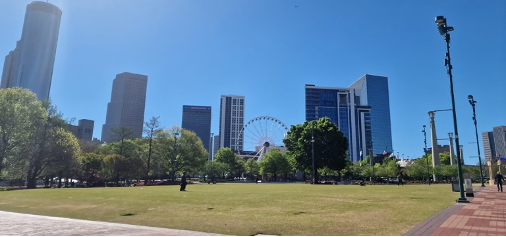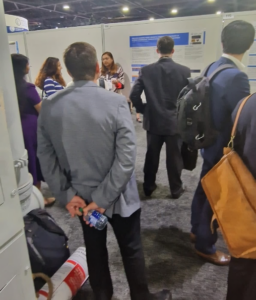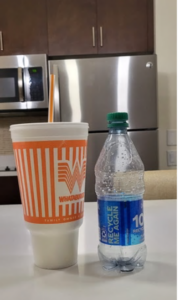ACC Annual Scientific Session & Expo 2024

April 26th, 2024
While bouncing around during inflight turbulence I could not fathom that, once I touched down in Atlanta, USA, I would be emersed in a gloriously rich and clear blue sky with a sunshine that could warm you from the inside out, writes Nida Ahmed, a Cardiology Registrar at Barts Heart Centre.
Saturday 6 April 2024 – the start of the 73rd Annual Scientific Session & Expo of the American College of Cardiologists. As I saw the tens of thousands of heart healthcare professionals piling in, I was awestruck that I had been invited to present my work here. It is one of, if not, the largest meeting of its kind in the world – heart doctors, allied healthcare professionals, medical technology developers, drug companies, plus many more were all in attendance.
I had been invited here to showcase my work to this impressive audience. The work itself is on those having TAVI (a minimally invasive cardiac procedure to replace the not-properly-functioning aortic valve of the heart) at Barts Heart Centre, St Bartholomew’s Hospital – the UK’s largest centre for this procedure. More broadly speaking, the way we promote research at this hospital means that I found a great environment to nurture my own spirit of innovation and embracing future possibilities, in this case Artificial Intelligence (AI).
I have been going to medical conferences since I was a student but these have been in the UK, Europe or sometimes the Middle East. What struck me, as I walked through the seemingly endless Expo Hall, was the scale of this mammoth meeting in the Deep South of the USA. This conference was about bringing together heart doctors and members of the heart team so they can hear about world-beating research projects which have implications for future care of patients with heart disease.
There are walkways after walkways of stalls by pharmaceutical companies, and other interested parties, who bring their latest wares which they market as filling the deficiencies in current practice. Yet what really caught my eye was the AI companies getting more floorspace at such a conference, and when I spoke to them about my project, I could see their eyes light up with excitement.
Heart disease (the biggest killer worldwide) seldom lives on its own. Many people with heart disease also have diseases of other body organs – sometimes a consequence of the heart disease itself, sometimes an association with the thing that caused heart disease in the first place. Kidney disease can be especially difficult to care for, so I was glad to see a stall by a patient education group focussed on kidney disease being given a dedicated space at this esteemed conference to promote their work – a sign of the increasing importance of different organ experts working together. I wondered whether this is reciprocated in other organ conferences.
Whilst elsewhere in the USA there was a momentous solar eclipse, the light of knowledge was shining brightly out of all of the Georgia World Congress Centre Halls.
 My time to present my project was on Sunday so I had all of the first Conference Day to soak up the atmosphere and share my work and experiences with other professionals. This was a truly momentous opportunity to promote St Bartholomew’s Hospital for its world-class cardiac service.
My time to present my project was on Sunday so I had all of the first Conference Day to soak up the atmosphere and share my work and experiences with other professionals. This was a truly momentous opportunity to promote St Bartholomew’s Hospital for its world-class cardiac service.
The hospital is older (much older, in fact) than the country I was presenting my work in and this is where I have the pleasure of working with and learning from prominent and world-renowned experts in TAVI. You may be wondering where AI comes into this.
One way to put it (though there sometimes seem to be endless definitions) is that AI is a machine’s ability to imitate human reasoning, problem solving and ability to learn. Let that sink in for a minute, human intelligence, our most prized possession (plus our opposable thumbs) is what has made us a dominant species. We have made systems to replicate this but with a capacity for data that is beyond what our own can handle. Crucially though, without human oversight, AI would be unusable.
It would not be an overstatement to say that AI will have a significant role in the future of healthcare. In an increasingly data-driven, sometimes complex, healthcare world, the question; what is the best treatment plan I can offer my patient, will need AI-supported research to find the answer. This wind of change is something I picked up on early in the AI revolution in healthcare. I wanted to know that I have the skills to find AI-derived answers and not be dependent on other entities for AI-insights (who may themselves have their own distractions). This has put me in the unique position of being a heart doctor who can do AI.
As a doctor my priority are my patients, their best interests and their wishes. This is what I was taught and what I practise to the point where it is ingrained in my nature. In the military, intelligence was considered trustworthy because of its integrity and provenance.
AI is a powerful voice but it can be dangerous because this might not necessarily be the case.
I knew to deliver the best results out of my project, to provide patients undergoing or thinking to undergo a TAVI with a risk prediction tool they and their doctor can use to improve outcomes, I would need to use AI-derived insights in making this predictor. I teamed up with AI experts to help me gain the skills I need to do the AI myself when making the predictor.
When using AI, I keep in sharp focus only what is best for patients and draw on my learned experiences as a heart doctor, to produce the most patient-centric work possible. Then to share that work with other healthcare professionals so as many people as possible can benefit from it. And so that’s what I did, with a very engaged and enthusiastic audience at my presentation, showing me this is exactly what’s needed right now.
 It took four centuries from the diagnosis of aortic stenosis to the first surgical intervention. The first TAVI was performed in 2002 yet since then (in this very short space of time) it has remarkably, and permanently, changed the landscape of this condition and the conversation on how to manage this illness. AI is the present and future gamechanger and it has been my pleasure to do the work at Barts and share it on an international platform.
It took four centuries from the diagnosis of aortic stenosis to the first surgical intervention. The first TAVI was performed in 2002 yet since then (in this very short space of time) it has remarkably, and permanently, changed the landscape of this condition and the conversation on how to manage this illness. AI is the present and future gamechanger and it has been my pleasure to do the work at Barts and share it on an international platform.
I would like to end on the beautiful city of Atlanta and fantastic experience I have had in the US. In case you are wondering; yes they do it bigger (that is a 500ml water bottle on the left) and Southern hospitality very much exists.
NIDA AHMED
Cardiology Registrar, Barts Heart Centre
